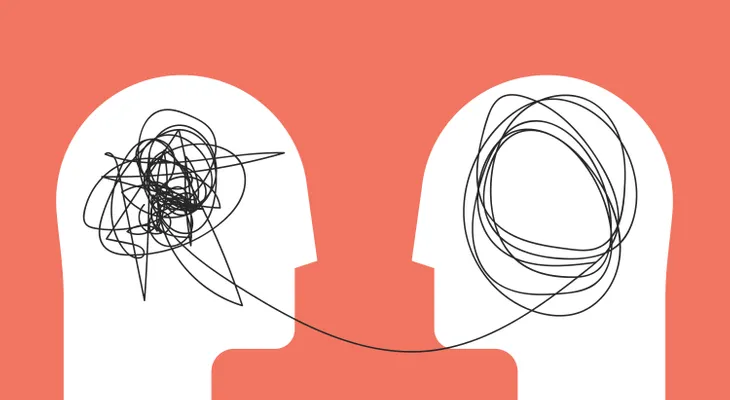- Talk therapy is a form of psychological treatment that involves talking with a trained therapist.
- Almost anyone can benefit from talk therapy but its effectiveness heavily relies on your willingness to be open to the process.
- There are many types of talk therapy, so it’s best to lean on a professional like your doctor or a trained therapist to determine which one is best for you.
We all experience emotional distress but it impacts some people more than others. And some people suffer from mental health disorders that affect their daily life. Talk therapy is one form of treatment that may help.
Talk therapy, also known as psychotherapy, is a form of psychological treatment that involves talking with a trained therapist. During your sessions, you’ll work with a therapist to identify negative thoughts and behaviors and work together to change them into positive ones. Follow along as we take a look at everything you need to know about talk therapy, including how it works, the different types, and who it may benefit.
What Is Talk Therapy?
Talk therapy, also known as psychotherapy, is used to help people talk about their “concerns, goals, and challenges with a person who holds no biases and no judgments,” explains Medical News Today. The goal of therapy is to help an individual identify and change negative thoughts and behavioral patterns to improve their state of mind.
Talk therapy can help diagnose mental health conditions but it can also simply be a safe place to talk about feelings and emotions. Keep in mind, sessions are always strictly confidential. The source says talk therapy may help you accomplish the following:
- Cope with stress
- Overcome anxiety
- Improve self-esteem
- Gain a better understanding of your emotions
- Process traumatic experiences
- Break unhealthy habits
- Identify triggers
- Discuss lifestyle changes
How Does It Work?
If you’ve decided to give talk therapy a try you can expect to meet with a trained therapist. During your first appointment, the therapist typically starts by asking questions to get to know you. Medical News Today says that you can expect to answer questions about your family history, mental health conditions, past traumas, how you cope with problems, and what goals you hope to achieve with therapy.
After the initial consultation, the therapist will then begin treatment. The source notes that therapy should be “an open-ended dialogue about any issues or concerns a person is facing.”
You can also expect the therapist to take notes during your session. Sessions typically last about 50-minutes to 1-hour and usually occur weekly or biweekly but the duration and frequency will be decided by you and your therapist.
Types of Talk Therapy
There are several types of talk therapy so it’s important to understand what each approach entails. This is a vital step in finding which one works best for you. Healthline explains that there are five broad categories of psychotherapy including:
- Behavioral therapy
- Cognitive behavioral therapy (CBT)
- Humanistic therapy
- Psychodynamic therapy
- Holistic or integrative therapy
Behavioral Therapy and Cognitive Behavioral Therapy
Behavioral therapy aims to identify and change “potentially self-destructive or unhealthy behaviors,” explains Healthline. And there are several types of behavioral therapy but one of the most common types is cognitive behavioral therapy. The American Psychological Association says CBT follows three core principles:
- Psychological problems are partially based on faulty or unhelpful ways of thinking.
- Psychological problems are partially based on learned patterns of unhelpful behavior.
- People who suffer from psychological problems can learn better ways to cope.
The goal of CBT is to help you recognize negative thoughts and behavior patterns and learn ways to change them. It can also help you identify how your thoughts and feelings can affect your actions. Identifying these patterns and learning how to change your behavior and thoughts can help you develop new coping strategies and in turn, decrease your symptoms.
Humanistic Therapy
Humanistic therapy has a different approach compared to behavioral therapy. The goal of this type of talk therapy is to help people “free themselves from disabling assumptions and attitudes so they can live fuller lives,” explains the National Library of Medicine.
Humanistic therapy is also different in that it focuses on your current day-to-day whereas other types usually focus on your past experiences. This type also aims to help the individual as a whole, rather than a specific diagnosis and this is typically done through active listening. It can help treat individuals with depression, anxiety, low self-esteem, panic disorders, personality disorders, addiction, schizophrenia, and relationship problems.
Psychodynamic Therapy
Psychodynamic therapy involves understanding how your past events affect your physical and mental health presently. Healthline explains that experts believe “people feel and act the ways they do for specific reasons,” and that your past experiences “shape how you act and see the world.”
During a session, a trained therapist will help you explore these experiences. The source also notes that the therapist may communicate in different ways, sometimes by indirect means, such as analyzing your dreams and fantasies to help you understand their meaning. They may also help you develop coping strategies to respond to challenging situations in a positive and effective way.
Holistic or Integrative Therapy
Healthline explains that this type uses an integrative approach. This means instead of focusing on one style of therapy, the therapist will blend different parts of other therapies to create a unique and tailored style for their client.
Again, which type of therapy is best for you will be decided between you and your therapist. Lean on a professional’s opinion if you’re not sure where to start. After an initial evaluation, a trained therapist will have a better idea of which type of therapy may benefit you the most.
Online Therapy Is Also an Option
In-office appointments aren’t the only way you can access therapy. Like many other things today, therapy has also moved online! The biggest benefit of online therapy is that you have access to a therapist from wherever you are. Whether you need an emergency session while vacationing or simply don’t want to leave the comfort of your home, you can access therapy from the palm of your hand.
Therapy is also available in a variety of online methods from phone calls and videoconferencing to online chatting and apps. Healthline points out that online therapy simply gives more people access to therapy and it also “helps minimize the stigma attached to mental health.”
How to Choose the Right Type of Therapy
Since there are many types of therapy, deciding which one is right for you can be a challenge. If you’re not sure, lean on professional advice from your doctor. A therapist can also help identify which type is right for you, after an initial consultation.
Medical News Today explains that ultimately, whichever type of therapy you choose should be proven to address your issues and help identify possible solutions.
Which Conditions Can Benefit From Talk Therapy?
Therapy has the potential to benefit anyone. It can help you develop coping skills through difficult times, such as the passing of a loved one or even not getting the promotion you wanted. However, therapy can also benefit an array of mental health conditions. Medical News Today says the following conditions may benefit from psychotherapy:
- Depression
- Generalized anxiety disorder or social anxiety
- Eating disorders
- Bipolar disorder
- Phobias
- Schizophrenia
- Post-traumatic stress disorder
- Obsessive-compulsive disorder
Keep in mind, this list only brushes the surface of conditions that may benefit from talk therapy. The source explains that talk therapy has the potential to benefit anything that interferes with an individual’s daily life.
The Benefits of Talk Therapy
There are many benefits of talk therapy. For starters, it can help diagnose and treat mental health disorders. If you’re dealing with relationship problems, talk therapy can also help navigate your issues and help you learn how to better communicate with the other party involved. It also provides an opportunity to discuss your problems with someone trustworthy and unbiased. Talk therapy may also help:
- Increase self-esteem
- Learn strategies for stress management
- Create self-awareness
- Teach you new coping skills to deal with distress
- Reduce the risk of mental health conditions
- Provide healing from anxiety, depression, trauma, and other mental health symptoms
Are There Any Downsides to Talk Therapy?
Of course, there are some drawbacks to talk therapy. For starters, Healthline points out that you may feel uncomfortable talking to a stranger about personal problems. But keep in mind, reputable therapists should be unbiased and trustworthy and while it can be uncomfortable at first, over time you’ll likely become more comfortable and the benefits can far outweigh this downside.
Treatment does take time which means it might take several sessions before you start seeing progress. This commitment can be a drawback for some people. Another potential downside is that therapy may not be covered by insurance so it may be an out-of-pocket expense. Always contact your insurance provider first to find out what coverage you have.
Is Talk Therapy Actually Effective?
So, you’ve weighed the pros and cons and now you’re wondering if talk therapy is actually effective. And it’s a valid question considering it can be a financial and time commitment. According to Healthline, talk therapy can be very effective, however, the effectiveness heavily relies on “your willingness to be open to the process and be honest about what you’re feeling.”
The source also notes that mental health experts and research also back up the claims that psychotherapy can be effective. But you’ll never really know until you try it for yourself. Talk to your doctor to find out if talk therapy is right for you or book a consultation appointment with a reputable therapist.
How to Find a Reputable Therapist
It’s important to find a therapist that isn’t only reputable but feels like a good fit. It can also be a challenging task as there are many therapists to choose from.
The first thing you need to do is establish which type of therapist you need. Then to narrow your search, start by asking your doctor for a referral to a reputable therapist in your area. You can also talk to trusted friends and family members for recommendations. If your insurance plan covers talk therapy, then they may even have a list of providers to choose from. Reading reviews can also be helpful.
The next step is to book an appointment. As mentioned, compatibility is important and can play a role in the success of your treatment. If it doesn’t feel like a good fit, don’t be afraid to move on and try another therapist.

















